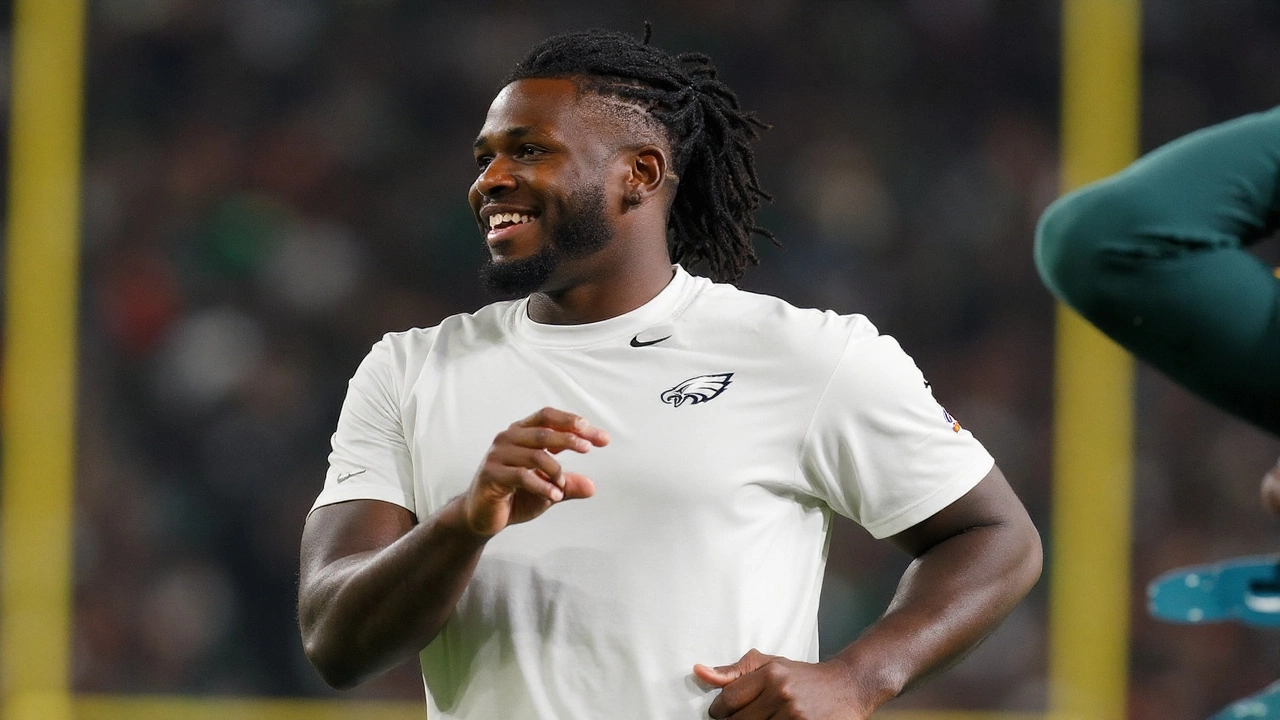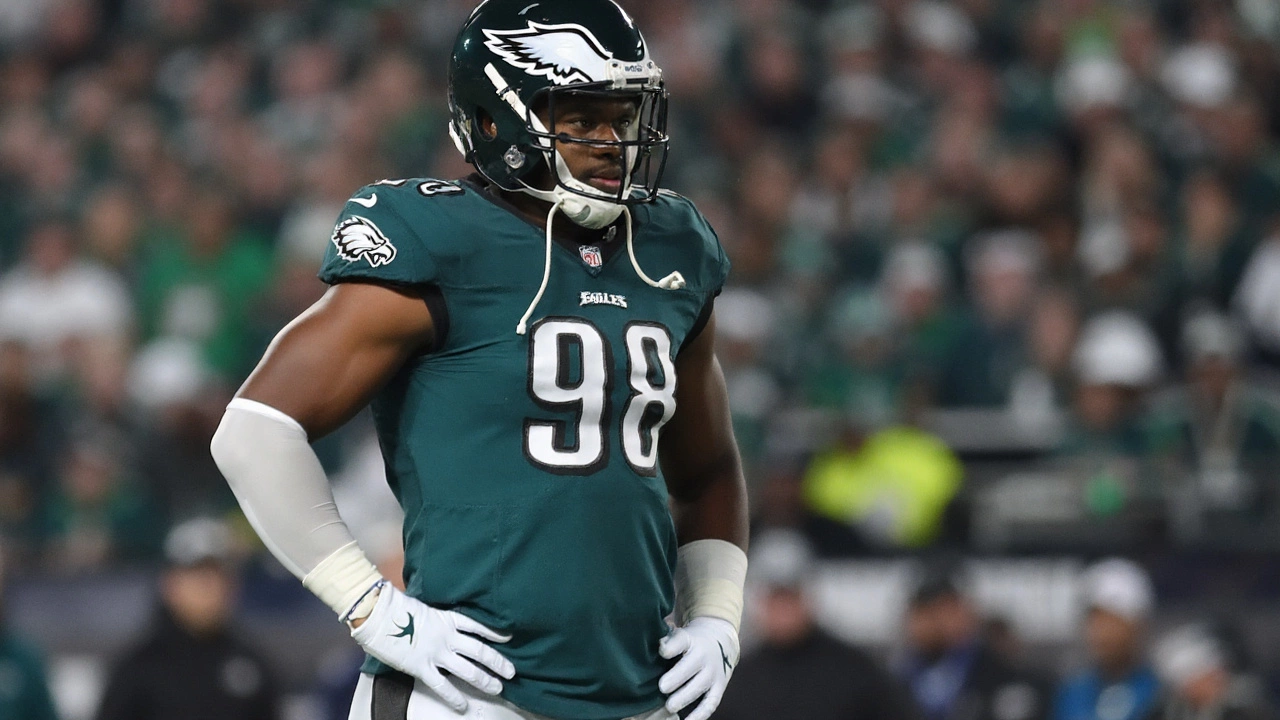Six seconds, a flag, and an ejection that stunned the NFL
Six seconds into the new NFL season, the defending champions lost one of their toughest linemen to a moment that will be replayed for weeks. Jalen Carter, Philadelphia’s disruptive defensive tackle, was ejected after appearing to spit on Dallas quarterback Dak Prescott right after the opening kickoff in the Eagles–Cowboys season opener on Thursday night.
The sequence unfolded fast. After the kick, Carter and Prescott exchanged words. Carter then appeared to spit on Prescott’s jersey. Prescott immediately pointed to an official. The flag came out, and the crew gathered. Referee Shawn Smith later told a pool reporter that an official saw Carter spitting on an opponent and called it a disqualifiable foul, describing it as a non-football act. That explanation matched what fans in the stadium felt—shock at how quickly the game’s tone changed.
The penalty added 15 yards to Dallas’s starting field position before a single offensive snap. The Cowboys cashed in with a short touchdown run to cap the opening drive. Carter, booed as he walked off with his helmet at his side, headed to the locker room. The night had barely started.
And still, Philadelphia settled in. Despite losing a star on the first play, the Eagles clamped down late and won 24–20. The defense, reshuffled on the fly, held Dallas to 20 points the rest of the way. It wasn’t pretty, but it was a test of composure they passed.
Carter, 24, was the No. 9 pick in the 2023 NFL Draft out of Georgia. He has been central to the Eagles’ identity up front—strong, explosive, and relentless. He played a major role in last season’s Super Bowl run and has been talked about as one of the top young defensive linemen in the league. Earlier this week, defensive coordinator Vic Fangio praised the edge Carter brings to the unit. That edge crossed a line on Thursday.
Ejections in the NFL are rare. One before the first snap from scrimmage is almost unheard of. Most early ejections come from fights, punches, or flagrant hits. Spitting is different. It’s personal, it’s visible, and officials are told to act decisively when they see it. The league calls it unsportsmanlike conduct and gives crews the authority to send a player off immediately.
For the Eagles, the impact was immediate and tactical. Philadelphia’s interior rotation had to adjust, with coaches leaning on the next men up to eat more snaps, absorb double teams, and anchor against the run. That’s not ideal against a divisional rival on a short week. The offense, meanwhile, had to steady the game, chip away at the deficit, and manage the clock—basic things that become harder when emotions spike.
Those emotions were obvious. Eagles fans groaned as the flag landed. Cowboys fans roared as Dallas moved into plus territory. On the sideline, both coaching staffs tried to cool things down. Rivalry games bring heat; opening night adds more. Players talk. Players push lines. But spitting is one of those lines that players across sports recognize as a hard stop. Soccer treats it as a straight red card. The NFL treats it as grounds for disqualification. It’s not about physical harm; it’s about disrespect.
After the game, Carter spoke with reporters but kept details tight, a standard move when the league office is about to review an ejection. That review process will look at all available angles and the game report from the officiating crew. Fines for unsportsmanlike conduct are common, and suspensions are possible if the league believes the act was intentional and egregious. Philadelphia will also decide whether to address it internally, which can range from private conversations to team fines.
Officials will come under the microscope as well, though the mechanics here were straightforward. An official said they saw an act that qualifies as unsportsmanlike conduct and used the authority the rulebook gives them. When the act is deemed “non-football” and overtly unsportsmanlike, the standard is to penalize and, in certain cases like this, eject. The crew did not need a lengthy conference or replay to make that call.
On the Dallas side, Prescott did what veteran quarterbacks do: he flagged it, then moved on to the next play. Quarterbacks get baited all the time. They have to be careful responding, especially early, when any counterpunch risks a matching penalty. The Cowboys found points on their first drive, but they spent the rest of the night wrestling with a defense that tightened as the game went on.
Carter’s résumé makes this sting more. He’s a tone-setter on a line built to wreck pockets. Teams scheme protections around him. On third downs, his explosion can flip a drive. When that kind of player exits in the first 10 seconds, the ripple effects hit substitutions, packages, and play-calling. You’re asking backups to execute specialized roles with almost no warning. Credit to Philadelphia’s defensive staff for stabilizing the front and to the veterans who kept their rush lanes and didn’t chase the game.
There’s also the reputational layer. Carter entered the league with the talent of a top-five prospect and the spotlight that comes with it. His on-field performance since has backed up the hype. Incidents like this, if left unaddressed, can follow a player, especially one as visible as a starting defensive tackle on a title contender. That’s why the next 72 hours matter—what the player says privately, what the team reinforces, and how the league rules.
For fans asking what the rule actually says: the NFL’s conduct rules prohibit spitting on, at, or near an opponent as a form of taunting or abuse. It falls under unsportsmanlike conduct and can be deemed flagrant. A flagrant act opens the door to ejection at the referee’s discretion. It also triggers the league’s automatic postgame review for discipline. No scoreboard situation changes that. Whether it happens in the first minute or the final two, the call stands on its own.
Could Philadelphia face more fallout? If the league fines or suspends Carter, the Eagles may have to patch the interior again next week. That means more stress on the rotation and more snaps for younger linemen. It also means an early-season test of culture—how a locker room absorbs a self-inflicted hit and keeps the standard. This team did that on Thursday. Doing it repeatedly is harder.
What about the Cowboys? They’ll point to missed chances after that opening drive. They had the early break and still left points on the field. Divisional road games are tricky, and 20 points won’t win many nights against top offenses. They’ll like the start. They won’t like the finish.
Back to the heart of the moment: cameras caught an act that, to most viewers, looked clear. The official said he saw it live. The referee labeled it non-football and disqualifiable. That alignment—visuals, observation, rule—made this a fast decision. The time on the clock made it extraordinary. The NFL can go whole weeks without an ejection. Getting one before the first snap will stick out for years.
If there’s a lesson here for players, it’s one they hear every camp: don’t hand the opponent free yards, and don’t put the officials in a spot where they have only one choice. The play is dead. Walk away. Rivalry chatter will always be part of the game. Staying inside the line is part of being a pro.
Opening night was supposed to be a celebration for the champions, a rivalry on a national stage, and a tone-setter for the year. It still delivered drama and a tight finish. It also delivered a headline no one expected: a six-second ejection that will keep the league office busy and every defensive meeting room talking about where emotion ends and discipline begins.

What comes next: review, discipline, and a quick reset
The league’s standard timeline is straightforward. By the start of the week, the NFL will notify teams of fines. If a suspension is on the table, that decision typically follows after a full review of the officiating report and available video. Players can appeal fines, and teams often keep their comments measured until the process plays out. Expect both clubs to be asked about it again when they return to practice.
Philadelphia’s coaching staff will treat the tape like any other game: correct the errors, highlight the resilience, and move on fast. They’ll stress situational awareness—what to do when tensions rise right after a kick, who steps in to separate players, and how to avoid giving away free yards. You could see that messaging in the way the Eagles settled down, won the field-position battle late, and trusted their defense to slam the door.
For Carter, the next steps are simple and serious. Cooperate with the review. Own the moment. Rebuild trust in the room. Teammates see everything. Leaders notice how a player responds after a mistake. NFL careers are defined as much by those responses as by splash plays on Sundays.
For Dallas, the focus shifts to cleaning up the middle quarters and finishing drives. They got a gift to start and didn’t turn it into a two-score cushion. Against a team that can score in chunks, that’s costly. The tape will show chances to extend the lead that slipped away.
No one wanted the first viral clip of the season to be an ejection. It is anyway. The rivalry will have another game, the league will issue its ruling, and the season will march on. But the opener set a talking point that will shadow both teams for a bit: the thinnest line in football isn’t the sideline; it’s the one between playing with an edge and crossing it.
